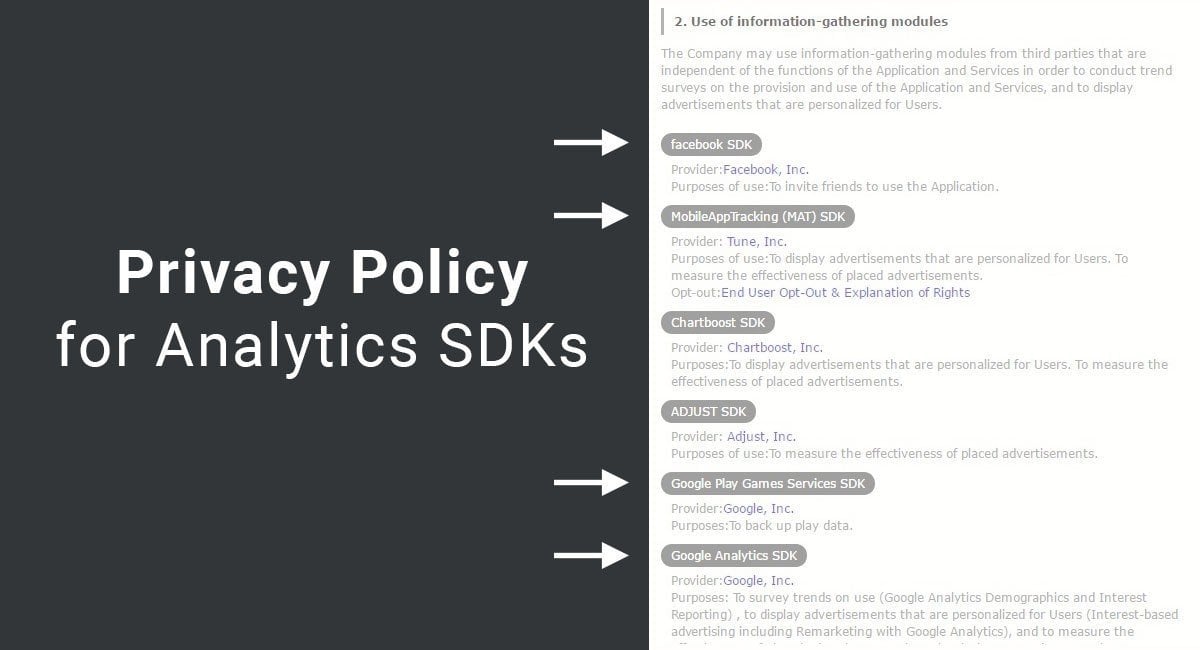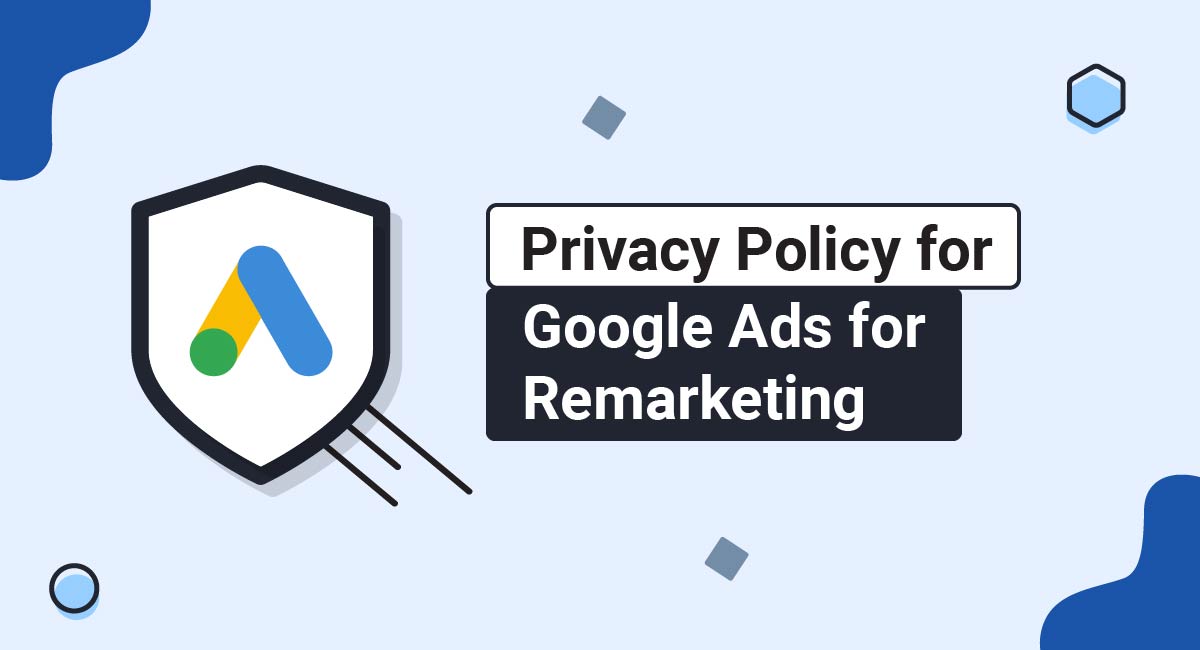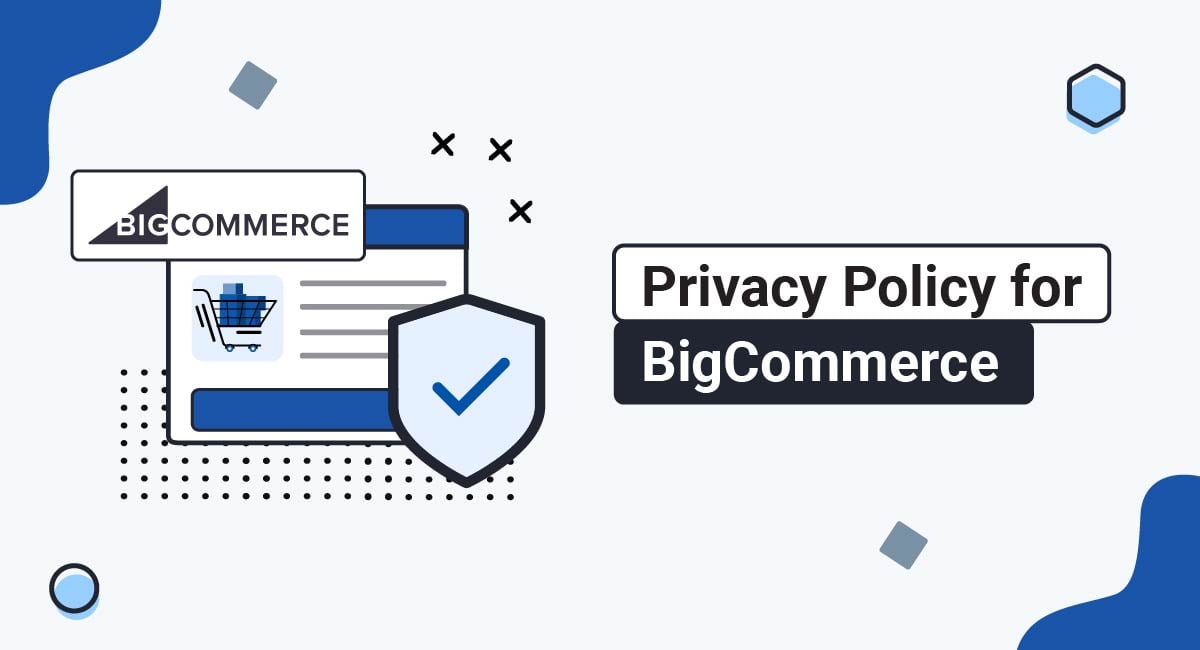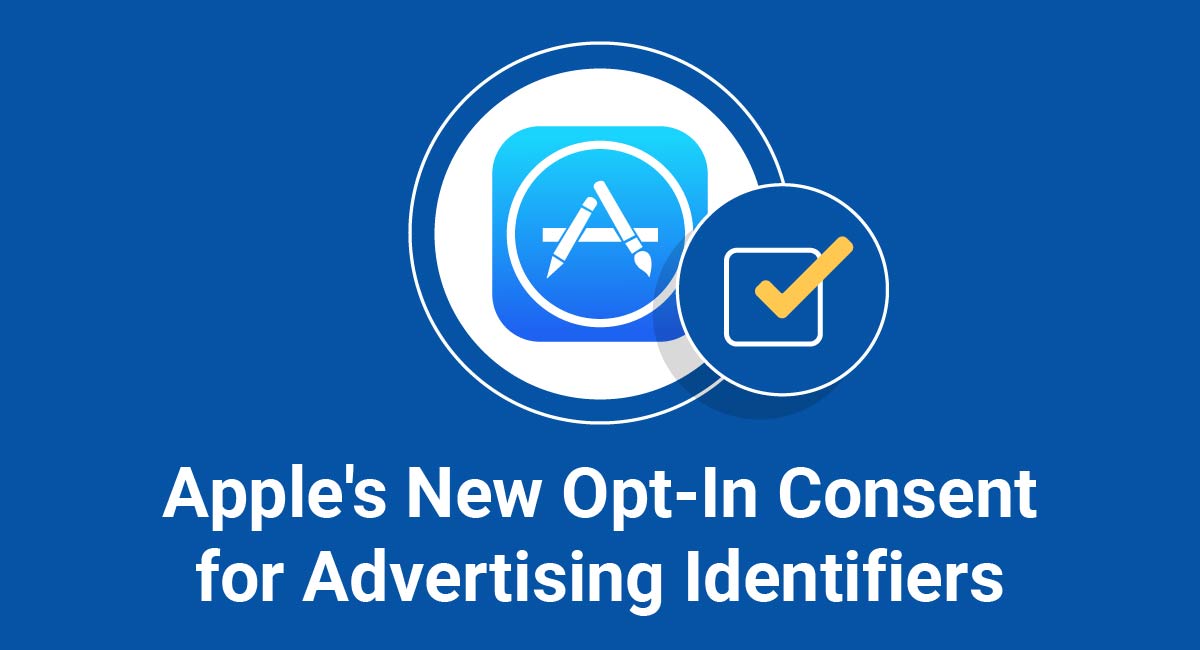Software Development Kits (shorten as SDKs) are programming packages that allow programmers to develop mobile applications that are designed to work on or with a specific platform.
For example, an Android SDK would enable a developer to create applications that would work on an Android platform. Included in these packages are things like development tools, required libraries of code, sample projects with usable source code, and an emulator for testing while developing.
Analytics SDKs work very much the same way.
A developer obtains the SDK from a third-party such as Google Analytics SDK, Mixpanel or Flurry and is then able to integrate it into his mobile applications.
The Analytics SDK will allow the developer to track and measure certain data about the way users interact with the associated mobile apps. This can trigger the need of having a Privacy Policy or updating the current version of your agreement to include specific clauses.
Our Privacy Policy Generator makes it easy to create a Privacy Policy for your business. Just follow these steps:
-
At Step 1, select the Website option or App option or both.

-
Answer some questions about your website or app.

-
Answer some questions about your business.

-
Enter the email address where you'd like the Privacy Policy delivered and click "Generate."

You'll be able to instantly access and download your new Privacy Policy.
Analytics SDKs collect information about app usage including data about many users are using the app, the number of sessions running on an app and how long each session is, from where in the world these users are logged in from, how many times an app is crashing, what operating systems and devices are running the app, the amount of money spent within apps by users, and how many times certain app features are used.
Custom metrics can be created through the SDKs that allow developers to track data such as how users with specific attributes or traits interact with an app, or how long it takes users to reach a custom-defined goal.
Developers can then use this data to improve the app. Technical issues can be discovered and fixed, such as frequent app crashing. Unpopular features can be removed or updated to get more use.
By seeing how an app is used with the information gathered through an Analytics SDK, an app can be accordingly improved to be the most popular and financially successful app that it can be.
The main Analytics SDKs
There are three main platforms offering analytics functionality to mobile developers:
- Google Analytics SDK
- Mixpanel
- Flurry
Google Analytics SDK
![]()
Google Analytics SDK is provided by Google and integrates smoothly with Google Analytics.
Google Analytics is a long-running and widely used service that collects data about website visits and usage, such as how long a visitor stays on a website, and from where in the world the visitor is located and provides this data to website operators.
Google Analytics SDK is the mobile version. It allows developers of mobile apps to obtain this same sort of data about mobile app usage. Google Analytics SDK is a classic in the industry and comes with the long-running reputation of Google and Google Analytics.
Mixpanel SDK

Mixpanel is an innovative way to track analytical information about how people are using and interacting with your website and mobile app.
Mixpanel is known for providing instant, real-time and highly-detailed data about how a user is interacting with your mobile app beyond the original analytics metrics most of us are used to considering, such as page visits.
Mixpanel provides more information for a developer to deeply consider and analyze when it comes to how users are interacting with his app.
Flurry SDK
![]()
Flurry is an incredibly popular and widely-used analytics tool that focuses solely on mobile device analytics. A marketing component to Flurry uses analyzed user data to deliver tailored mobile advertisements that would be most effective for the market of specific apps.
For developers who focus solely on mobile apps that are monetized and include advertisements, Flurry is a favorite.
Depending on your specific needs, any one of these three Analytics SDKs can be the right choice for a developer of mobile apps. Each one has different benefits and perks, as well as different requirements for the developer when implementing the SDK into an app.
Privacy requirements from these SDKs
Analytics SDKs always require developers to include Privacy Policies in mobile apps that have the SDKs integrated within them.
This is because any sort of tracking or analytical technology that records information about app users raises issues of privacy.
Giving people the option to opt out of the analytics data collection is also a requirement that helps protect the privacy choices of users.
Here what's required when it comes to your Privacy Policy agreement in each of these analytics platforms.
Google Analytics
The Privacy Policy of Google Analytics includes a section specific to Analytics SDK within the "Privacy Controls" section.
This section requires:
the owners of any site, app, or other digital device or service that implements any alternative collection method and/or feature via the Google Analytics SDK .... are required by our policies to provide notice and offer a choice (such as an opt-out) to users.
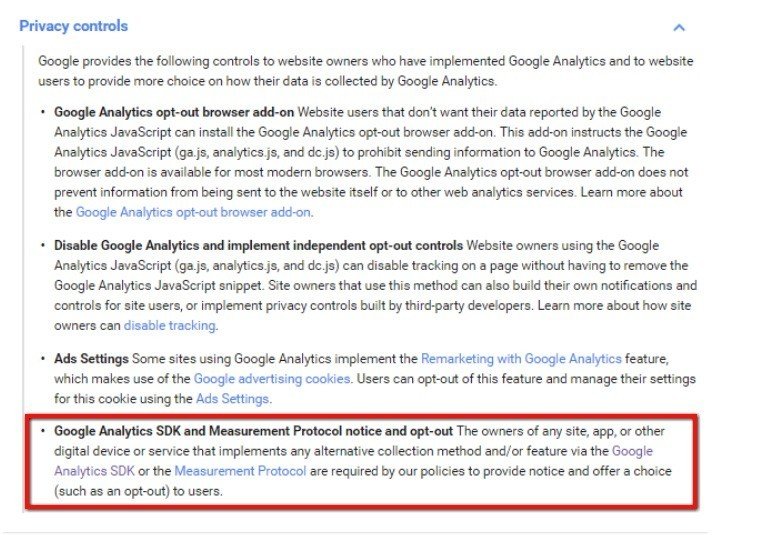
Even for websites a Privacy Policy is required by Google Analytics.
Mixpanel
Mixpanel includes a section in its Terms of Use page where privacy issues are covered.
In this section, Mixpanel notes that if you're a customer of Mixpanel - if you are a developer who has integrated the Mixpanel Analytics SDK into your mobile app - you agree to provide appropriate notices to and obtain appropriate consent from users whose information you collect or whose usage you track.
Mixpanel states that "appropriate notices may include notice in the form of a privacy policy posted on the Customer's site, in Customer's mobile application…."
If you use Mixpanel, you must also "include a notice about the Mixpanel opt-out for Customer's site and the Mixpanel opt-out link in Customer's privacy policy or in a notice on Customer's website(s)."

Flurry
Flurry strongly states in its Terms of Service page that anyone using its service "must post a privacy policy" that provides "notice of your use of a tracking pixel, agent or any other visitor identification technology that collects, uses, shares and stores data about end users of your applications".
It also requires developers that a link to the the Privacy Policy of Flurry to be included, or that the opt-out feature for its Flurry Analytics Service be provided in an easy-to-find manner.
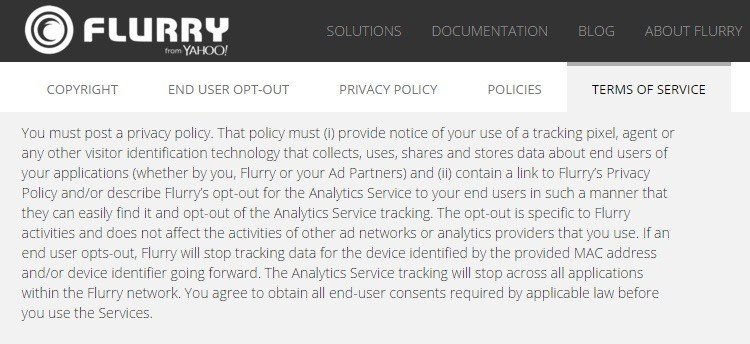
Examples
TriDef
TriDef includes a Privacy Policy that discloses its use of Google Analytics SDK.
Users are informed that TriDef "may automatically receive and store certain types of data" whenever a user interacts with the app via Google Analytics SDK.
Information that may be tracked is outlined, such as what features are used and for how long. Users are informed of how the information is used - "to make improvements to the user experience over time."
A link to Google's Partner Privacy and Terms is included where users can find out more about information.

Valedo
The Privacy Policy of Valedo includes a section titled "Data Privacy Policy".
Within this section is a series of sub-sections where the use of Flurry is disclosed to users. In the "Type of Data" sub-section, users are informed that "the Valedo application contains an application named Flurry Analytics."
Users are told specifically what information is collected by the Flurry app, including platform, app version, device ID, iOS IDs for advertising and sellers, operating time of device and timezone, etc.

The section titled "Purpose of the Collection, Processing and Utilization" informs users of why the above-mentioned information is collected: "To find out how users interact with the Valedo application... and how the Valedo app works on various devices."

Monster Strike
The Monster Strike site has a Privacy Policy that discloses and briefly describe each of the SDKs in use, as well as links to the provider of the SDK so users can easily find out more information.
If your app uses a number of different SDKs, you may be required to disclose each individually by the name, so be sure to check the individual requirements on the privacy of data of each SDK you sign up to use to see exactly what's required of you.
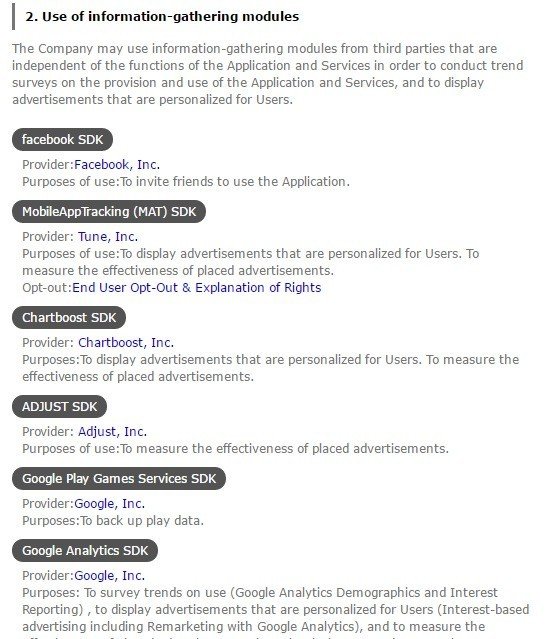
Dischord
The Dischord app from Hammer & Chisel has a Privacy Policy that lets users know that Mixpanel is used.
Links to the terms of is included, as well as a link to the Mixpanel Opt-out page. This is a simple way to give users basic information and notice that a third party is collecting information, and give them a method to find out more if they desire to do so, including how to opt-out.

If you use any Analytics SDKs for your mobile app, make sure to check with each platform to find out about any requirements for Privacy Policies that you'll need to meet.
Typically, at a minimum, you'll need to disclose to your users that you're using a third-party platform and provide information on how users can opt out of that particular SDK's tracking services.

Comprehensive compliance starts with a Privacy Policy.
Comply with the law with our agreements, policies, and consent banners. Everything is included.
